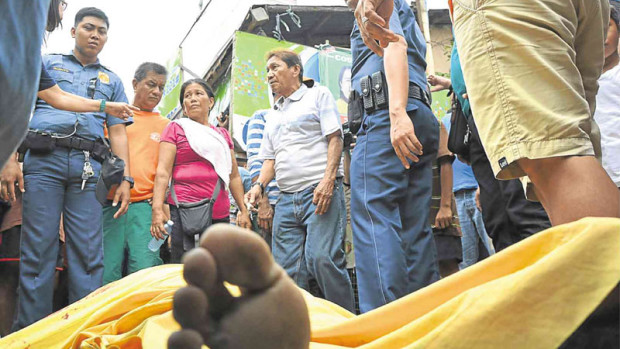Look into extrajudicial killings under Duterte, Congress pressed

ANOTHER ONE BITES THE DUST Funeral parlor workers lift the body of one of the two drug suspects who were killed in an alleged shootout with police in Barangay Bonuan Tondaligan in Dagupan City on Monday. RAY B.ZAMBRANO/INQUIRER NORTHERN LUZON
Ifugao Rep. Teddy Baguilat sought an inquiry in aid of legislation on the spate of “extrajudicial killings” of suspected criminals at the start of the administration of President Rodrigo Duterte.
In House Resolution No. 61, Baguilat, a member of the Liberal Party, called on Congress to investigate the “spate of extrajudicial killings and/or summary executions of suspected violators of laws on illegal drugs and other suspected criminals.”
READ: THE KILL LIST
Baguilat cited Article III, Section 1 of the Constitution that reads “No person shall be deprived of life, liberty or property without due process of law, nor shall any person be denied the equal protection of the laws.”
He also cited Article III, Section 14 paragraph 1 which reads “No person shall be held to answer for a criminal offense without due process of law.”
Article continues after this advertisementBaguilat also said the charter states that “in all criminal prosecutions, the accused shall be presumed innocent until the contrary is proved…”
Article continues after this advertisementBagulat said since Duterte assumed office on June 30, at least 23 persons suspected of violating laws against illegal drugs were killed by law enforcers “under vague circumstances.”
He added that even before Duterte’s inauguration, at least 68 drug suspects were killed in police operations in the country from January 1 to June 15, and 25 more were killed from June 16 to 20, “demonstrating a shocking increase in police-perpetrated killings.”
Meanwhile, the Philippine National Police reported 22 suspected drug-related killings outside police operations from May 14 to June 30, Baguilat said.
Baguilat said the spate of summary killings on the hands of the police who were mandated to enforce the rule of law is a violation of the constitutional right of suspected criminals.
BACKSTORY: Duterte vows to continue killing criminals ‘in accordance with law’
“The seemingly unchecked outbreak of extrajudicial killings executed by civil servants trusted by the people to enforce the law indicates a violation of the Constitution…” Baguilat said.
Baguilat also said the extrajudicial killings represent a “deterioration of the rule of law which can lead to people taking the law into their hands,” thereby leading the country towards the path of “lawlessness and anarchy.”
“There is therefore a clamor from the public and government officials alike to look into the disturbing trend of extrajudicial killings of suspected drug criminals,” Baguilat said.
“It behooves Congress, as the people’s instrument for securing social order through the establishment of just laws and thus the rule of law, to scrutinize the circumstances behind the aforementioned killings, with a view to ensuring that the people’s rights and lives are protected, especially by law enforcers,” he added.
Baguilat expressed alarm over the summary killings of criminals, a quick fix supported by President Duterte to eradicate criminality and illicit drug abuse in the country. IDL